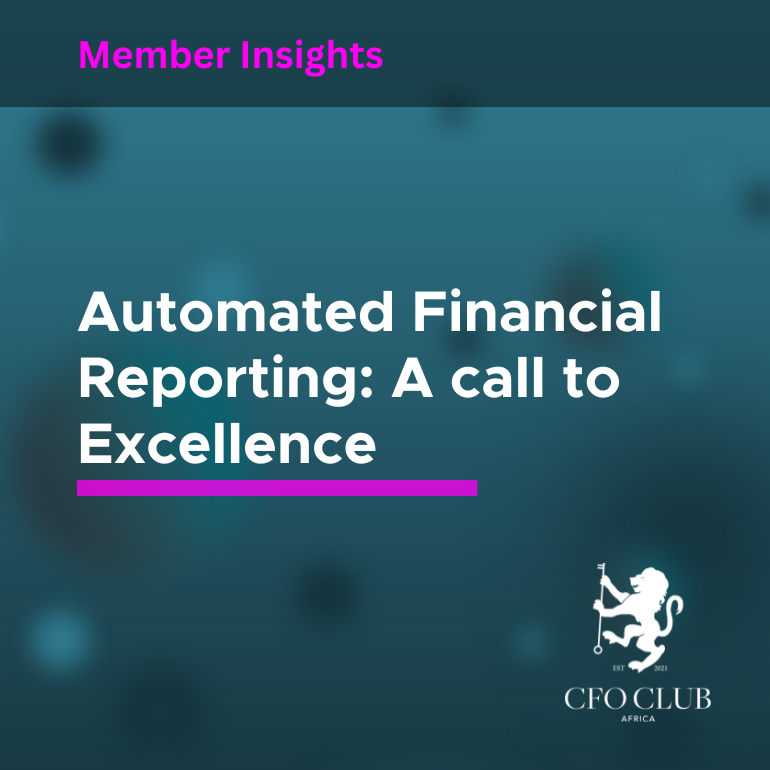Automated Financial Reporting: A call to Excellence
By Lutic Molo Mosoane
When I reflect on the evolving business landscape, I am reminded of the pivotal role financial reporting plays. As someone passionate about justice and precision, I find parallels between dismantling societal injustices and addressing inefficiencies in business processes. Both require a commitment to excellence, a refusal to accept the status quo, and a vision for transformation. Financial reporting is no different. It’s not merely numbers on a page but it’s the heartbeat of accountability and the foundation of trust with external stakeholders, particularly investors.
At the core of this conversation lies a simple truth: flawless financial reporting is nonnegotiable. Yet, human errors, no matter how unintentional, can tarnish the integrity of these reports. This is why I’m calling CFOs to rise to the occasion and embrace automation as an act of leadership and stewardship.
The Price of Errors in Financial Reporting
The errors in financial reporting are not just oversights; they are breaches of trust. Investors rely on your numbers to make informed decisions. Your reports shape their confidence in your organization’s ability to deliver. Every error, no matter how small, plants seed of doubt.
Consider the case of Hertz, the global car rental company. In 2014, an accounting error resulted in the company overstating its income by R849 million. The mistake led to restatements, legal challenges, and loss of investor confidence. Such incidents emphasize why CFOs must move beyond manual processes that expose financial reports to errors. This reality demands that we reimagine our processes, not as tasks to be completed but as sacred trusts to uphold.
The Power of Automation
Automation in financial reporting is more than a technological upgrade; it’s a cultural shift. It’s
a commitment to integrity and a strategic step toward excellence. Here’s why CFOs should
consider this transformation:
1. Precision Over Perfection
Human errors account for nearly 40% of financial misstatements in businesses today.
Automated reporting systems minimize data entry errors and ensure every report is accurate.
2. Agility in Reporting
Traditional financial reporting cycles can take weeks. With automation, companies can cut
reporting time by 30-50%, delivering real-time insights to executives and investors.
Consider Siemens, which transformed its financial reporting process through automation. The
company implemented AI-powered analytics to generate real-time financial reports, reducing
its quarterly close process from 9 days to 4 days. This allowed leadership to make faster, data-driven decisions.
3. Cost Savings and Efficiency
A study by McKinsey found that businesses adopting financial automation save up to 50% on
accounting operational costs. That’s because automated reporting eliminates redundant
tasks, optimizes workflows, and reduces reliance on extensive manual labour.
Case in Point: IBM automated its financial reporting processes and cut 75% of its time spent
on closing the books. The result? More focus on strategic decision-making instead of
crunching numbers.
4. Compliance and Risk Reduction
The regulatory landscape is ever evolving. Automation helps organizations comply with IFRS,
GRAP, and local tax regulations by ensuring all reporting follows the latest legal frameworks.
Challenges of Automating Financial Reporting (And How to Overcome Them)
While automation offers many benefits, CFOs must navigate potential hurdles. Here are
common challenges and how to address them:
1. High Implementation Costs
Many companies hesitate due to the upfront cost of automation software. However, the long term savings far outweigh the investment. To mitigate this, CFOs can start small; automating reconciliation and reporting workflows first before scaling.
2. Employee Resistance to Change
Teams accustomed to traditional reporting methods may resist automation. To address this, CFOs must foster a culture of learning, investing in training programs and demonstrating how automation enhances not replaces human expertise.
3. Data Integration Issues
Legacy systems might not integrate seamlessly with new automation tools. A solution? Cloud based automation platforms that easily sync with ERP and accounting systems.
A Call to Action for CFOs
This isn’t just about technology; it’s about leadership. CFOs, you are the custodians of your organisation’s financial credibility. By championing automation, you set a standard that echoes throughout the organization, a standard of precision, innovation, and forward-thinking.
Automation doesn’t replace the human element; it empowers it. Your team’s creativity and strategic insights are liberated from mundane , enabling them to focus on what truly matters, driving growth and creating value.
Rise to the Challenge
In embracing automation, you are not just upgrading systems; you are setting a new standard for excellence in financial reporting. You are ensuring that the story your reports tell is one of trust, transparency, and unwavering commitment to quality.
Let’s rise together, CFOs, as agents of transformation, proving that in every detail, no matter how small, we stand for integrity. Because as leaders, we don’t just manage processes; we shape legacies.
#RiseUpForExcellence.

